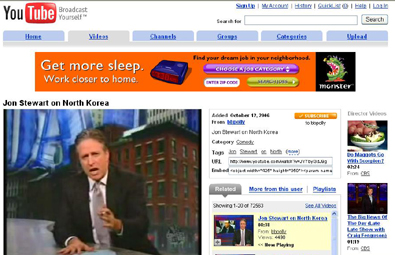Online video game: 'technically illegal' musical chairs

Google CEO Eric Schmidt said at the Search Engine Strategies conference last August, “I've learned that the law is not as crisply defined in this area as you might want.”
Columbia Law School professor Tim Wu offers a somewhat oxymoronic characterization of the status of online video, “technically illegal” (see "Google ’safe harbor’: ‘Nice’ way to do business?"):
What does a lack of “crisply defined” game rules breed? An online scramble.It's not 'fair use,' the famous right to use works despite technical infringement, for reasons of public policy. Instead, it's in the growing category of 'tolerated use'—use that is technically illegal, but tolerated by the owner
An odd email from “Jeff” made the rounds this weekend:
YouTube Takes Down Comedy Central Clips Based on DMCA ClaimsIf you visit YouTube, all Daily Show, Colbert Report and South Park clips now show ‘This video has been removed due to terms of use violation.’
When I received the email last Friday, I did a quick search for “Jon Stewart” at YouTube and found that he is indeed still tickling the funny bone. Some Comedy Central owned videos may have been removed from YouTube at the request of someone, but such actions may only represent the latest “stop in the music” in the online video game of musical chairs.
Other recent “stops in the music” in online video?
October 20, 2006 Reuters report:
Google's YouTube removed 29,549 video files from its popular Web site after receiving a demand from a group of Japanese media companies over copyright infringement
October 17, 2006 Reuters report:
Universal Music Group said on Tuesday it has filed lawsuits against video-sharing sites Grouper and Bolt.com for allowing users to swap pirated versions of its musicians' videos.
The “technically illegal” online video game plays on, however, for players on favored teams:
In “Google YouTube buys off music companies on the cheap” I put forth:
Google’s uncanny ability to cow the world’s content owners into Google submission is a key factor in its $130 billion market capitalization and its 25% profit margins (see Google: Web friend or web foe?)…
Google has also apparently succeeded in neutralizing potential copyright infringement claims from three of the four largest music companies in the world, collectively representing more than 50% of the $30 billion plus global recorded music market, at the very Google friendly cost of about $50 million in stock.
